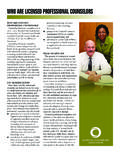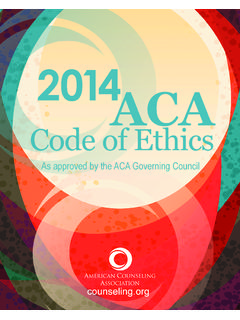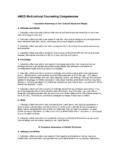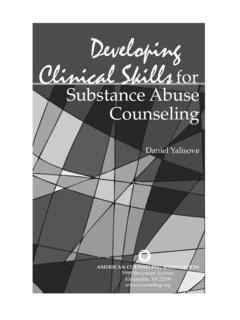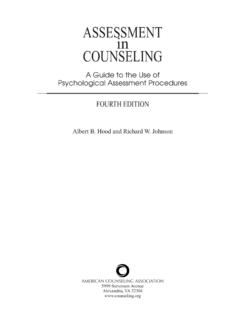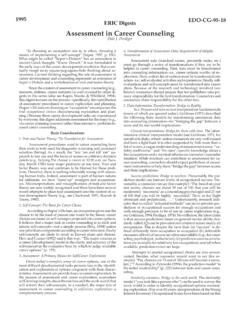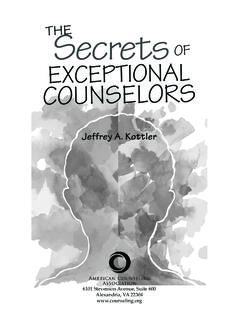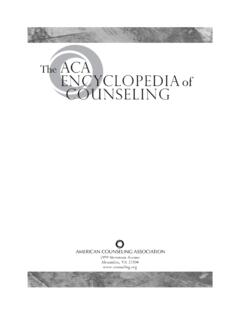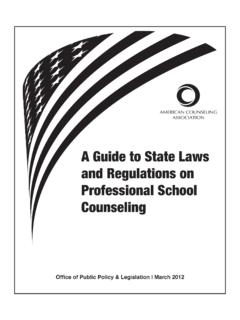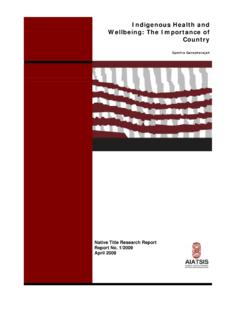Transcription of Vicarious Trauma - American Counseling Association
1 Fact Sheet #9. 10/11. Vicarious Trauma The term Vicarious Trauma (Perlman & Saakvitne, 1995), sometimes also called compassion fatigue, is the latest term that describes the phenomenon generally associated with the cost of caring for others (Figley, 1982). Other terms used for compassion fatigue are: secondary traumatic stress (Stemm, 1995, 1997). secondary victimization (Figley, 1982). It is believed that counselors working with Trauma survivors experience Vicarious Trauma because of the work they do. Vicarious Trauma is the emotional residue of exposure that counselors have from working with people as they are hearing their Trauma stories and become witnesses to the pain, fear, and terror that Trauma survivors have endured. It is important not to confuse Vicarious Trauma with burnout . Burnout is generally something that happens over time, and as it builds up a change, such as time off or a new and sometimes different job, can take care of burnout or improve it.
2 Vicarious Trauma , however, is a state of tension and preoccupation of the stories/ Trauma experiences described by clients. This tension and preoccupation might be experienced by counselors in several ways. They might: avoid talking or thinking about what the be in a persistent arousal state Trauma effected client(s) have been talking about, almost being numb to it Counselors should be aware of the signs and symptoms of Vicarious Trauma and the potential emotional effects of working with Trauma survivors. Signs and symptoms for counselors: having difficulty talking about their diminished joy toward things they once feelings enjoyed free floating anger and/or irritation feeling trapped by their work as a startle effect/being jumpy counselor (crisis counselor). over-eating or under-eating diminished feelings of satisfaction and difficulty falling asleep and/or staying personal accomplishment asleep dealing with intrusive thoughts of losing sleep over patients clients with especially severe Trauma worried that they are not doing enough histories for their clients feelings of hopelessness associated with dreaming about their clients/their their work/clients clients' Trauma experiences blaming others Vicarious Trauma can impact a counselor's professional performance and function, as well as result in errors in judgment and mistakes.
3 Counselors may experience: Behavior: frequent job changes exhaustion tardiness talking to oneself (a critical symptom). free floating anger/irritability going out to avoid being alone absenteeism dropping out of community affairs irresponsibility rejecting physical and emotional overwork closeness irritability Interpersonal: staff conflict avoidance of working with clients with blaming others Trauma histories conflictual engagement lack of collaboration poor relationships withdrawal and isolation from poor communication colleagues impatience change in relationship with colleagues difficulty having rewarding relationships Personal values/beliefs: dissatisfaction worried about not doing enough negative perception questioning their frame of reference . loss of interest identity, world view, and/or spirituality apathy Disruption in self-capacity (ability to blaming others maintain positive sense of self, ability to lack of appreciation modulate strong affect, and/or ability lack of interest and caring to maintain an inner sense of detachment connection).
4 Hopelessness Disruption in needs, beliefs and low self image relationships (safety, trust, esteem, control, and intimacy). Job performance: low motivation avoidance of job responsibilities increased errors over-involved in details/perfectionism decreased quality lack of flexibility Vicarious Trauma can also impact a counselor's personal life, such as relationships with family and friends, as well as the counselor's health , both emotional and physical. Fact Sheets are developed and distributed by the American Counseling Association 's Traumatology Interest Network, and may be reproduced for use with first responders, and mental health volunteers, without written permission, but cannot be included in materials presented for sale or profit, nor other publications. The American Counseling Association must be credited in all reprints/adaptations, including those produced by third parties.
5 Please download the most updated versions by going to
